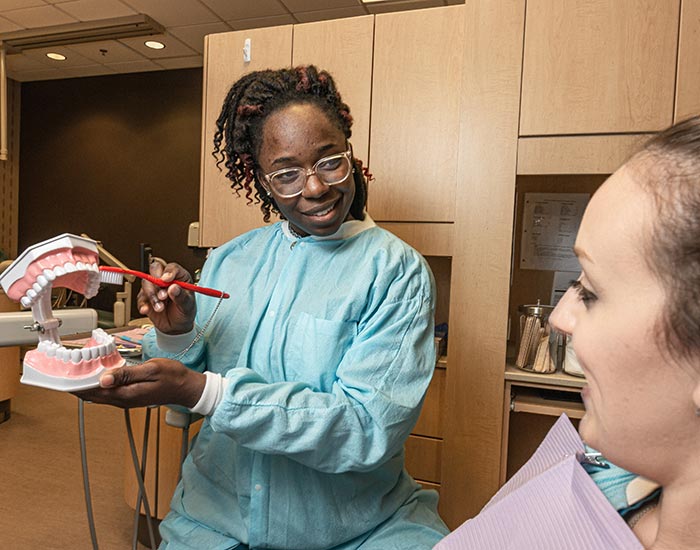Dental Hygiene
Degree Options:
Campus Location:
AthensDivision
Life Science & Public SafetyDental hygienists in a clinical role assess, diagnose, plan, implement, evaluate and document treatment for prevention, intervention and control of oral diseases, while practicing in collaboration with other health professionals. Employment of dental hygienists is projected to grow 11 percent from 2020 to 2030, faster than the average for all occupations.
The Dental Hygiene curriculum teaches the cognitive, psychomotor, and affective skills that will enable prospective dental hygienists to provide the highest quality of care to patients. It also integrates of and promotes the interrelationship between general education, biomedical science, dental science, dental hygiene science, and clinical practice components of preventative dental hygiene services. Upon completing degree requirements, graduates of accredited dental hygiene programs are eligible to take the written National Board Examination for Dental Hygiene, the Central Regional Dental Testing Service clinical exam, and /or the clinical board given in the state chosen for practice. After graduation, dental hygienists can find jobs in private dental practices, community clinics, hospitals, university clinics, prison facilities, nursing homes, or schools. According to the Bureau of Labor Statistics, the median annual pay for dental hygienists is $77,810. There are many opportunities to pursue further education after our program including; sales representative, corporate administrator, researcher, educator, or administrator.
Accreditation
The Dental Hygiene program is accredited by the Commission on Dental Accreditation. The Commission is a specialized accrediting body recognized by the United States Department of Education. The Commission on Dental Accreditation can be contacted at 800-232-6108 or at 211 East Chicago Avenue, Chicago, Illinois 60611-2678. The Commission’s web address is CODA.ADA.ORG
Student Learning Outcomes
Graduates of the associate of applied science degree program in Dental Hygiene will be able to complete the following tasks:
- Perform current services and function as a clinically competent dental hygienist.
- Use critical thinking skills in conjunction with the dental hygiene process of care: assessment, planning, implementation, and evaluation.
- Demonstrate an appreciation for and an understanding of the importance of being a member of the dental team and the importance of continued learning and professional development.
- Pass the Dental Hygiene Written National Boards and the Dental Hygiene Regional Clinical Boards.
- Demonstrate an appreciation for community involvement and the importance of being actively involved in professional organizations.
- Demonstrate the personal and professional ethics and interpersonal skills that are expected in the workplace
Specific Facility, Tools Or Educational Tools Available
The students provide dental hygiene care not only on campus in the dental clinic, but also at Athens Nurses Clinic, Mercy Health Center, and the UGA Dental Clinic. Community Dental Health is huge part of the Dental Hygiene Department at ATC. The lab, classroom, and clinic area provide students with real-world dental office equipment and simulations. The program allows the students to move through the curriculum working on simulated manikins, to working on peers, to working on live patients in the on-campus dental clinic.
Featured Courses
DHYG 2050- Pathology DHYG 1110- Clinical Dental Hygiene 1 DHYG 2200- Periodontology
Additional Details
Class Times Offered:
DaytimeDeadline for Selective Admission:
January 10th- Fall startAdditional Information:


